- Home
- Douglas E. Richards
BrainWeb
BrainWeb Read online
This book is a work of fiction. The characters, incidents, and dialogues are products of the author’s imagination and are not to be construed as real. Any resemblance to actual events or persons, living or dead, is entirely coincidental.
Copyright © 2014 by Douglas E. Richards
Published by Paragon Press, 2015
E-mail the author at [email protected]
Friend him on Facebook at Douglas E. Richards Author
Visit the author’s website at www.douglaserichards.com
All rights reserved. With the exception of excerpts for review purposes, no part of this book may be reproduced or transmitted in any form or by any means, electronic or mechanical, including photocopying, recording, or by any information storage and retrieval system.
First Edition
BrainWeb
Douglas E. Richards
PART 1
Outed
“Sons of Islam everywhere, the jihad is a duty—to establish the rule of Allah on earth and to liberate your countries and yourselves from America’s domination and its Zionist allies. It is your battle—either victory or martyrdom.”
—Ahmed Yassin, founder of Hamas
1
Abdul Hakim zipped up a gray jumpsuit to fully cover his elegant black tuxedo, protecting it from being marred by moist clay or dirt when he—inevitably—brushed up against the cramped tunnel walls. Clay or dirt residue on his tuxedo would give the world an obvious clue to his methods, which he wanted to avoid. Far better for all to believe that the appearance of his team was almost supernatural. His methods would ultimately be discovered, but the longer this could be postponed the better.
Hakim surveyed the eight men who surrounded him, each wearing a tux as well, as they also zipped up jumpsuits identical to his own for their journey through the tunnel. These were his brothers. He could not love them more, or be more proud of what they had accomplished together. And most importantly, what they would soon accomplish. A feat so daring, so flawless, and so perfectly executed that it would carve a deep psychological scar into the psyche of the West. Perhaps one even greater than that delivered by the brave heroes who had crashed jumbo jets into skyscrapers on September eleventh.
A tear came to Hakim’s eye as he considered the glory of what was to come. He blinked it away and gathered himself.
“Very soon,” he said to his brothers in Arabic, his voice echoing faintly off the steel walls of the nearly empty shell of a warehouse, “our existence on this earth will come to an end. But life is fleeting. And by dying in the name of Allah, for a great cause, we earn our just reward in Heaven.”
Hakim’s eyes burned with a zealous intensity and he struck a pose of determined, heroic nobility. “And not only will we live forever in Heaven, but our names and our legend will live forever on Earth. Our names, and what we are about to achieve, will be woven into the very fabric of the glorious history of our people’s ascendance. The events of these next many hours will never be forgotten. We will deliver a devastating hammer strike to the genitals of the infidel. One that will forever horrify the West, and bring great joy and pride to all true children of Islam.”
He paused, catching the eye of each man in turn and nodding slowly. “Allahu Akbar,” he whispered passionately with a mixture of pride, purpose, and ecstasy, and together the eight men responded in kind. “God is great,” they echoed, and several pairs of eyes were moist at the enormity of what they were doing.
Their emotion didn’t reflect fear of death, Hakim noted, his chest swelling even further with pride, but their eagerness to fulfill their noble purpose, to die as well as any man had ever died.
A poem ran through his mind, unbidden, recounting the courage of ancient warriors, hopelessly outnumbered, fighting to the death to protect the city of Rome.
Then said the brave Horatius,
The Captain of the Gate,
“To every man upon this earth,
Death cometh soon or late.
And how can a man die better
Than facing fearful odds.
For the ashes of his fathers,
And the temples of his Gods.”
How could a man die better, indeed, thought Hakim. The verse didn’t rhyme in Arabic, but this didn’t detract in the slightest from the immense power of these words.
With their jumpsuits now in place, each of Hakim’s comrades returned their lethal KH2002 assault rifles to their original positions, slung across their chests, to add to the hand-guns strapped to their sides. The Iranian designed KH2002 could spew death at a rate of eight hundred armor-piercing rounds per minute, each traveling three times the speed of sound.
Each man had packed designer leather duffel bags, filled with gas canisters, gas masks, night vision equipment, dozens of spare clips, and any and all other items they might possibly need. The bags were also large enough to conceal their assault rifles when necessary.
The operation had been planned to perfection, every possibility covered, every contingency accounted for.
Hakim took one last look around the empty warehouse that they had called home for many long months, and sighed. It, too, would not live out the next few days. It had been purchased almost a year earlier with generous funds supplied by an emir in Qatar, and was just over seven blocks away from their destination, the Cosmopolitan Theater.
Despite this proximity, tunneling through the seemingly impenetrable Los Angeles clay, even with power equipment, had been a slow and demanding task. Especially given the need to work only at night and to carefully relocate the earth they had removed, all the while being more cautious than field mice living among hawks.
But it had been well worth it. They had finished all but the last of the tunnel months earlier, ending it five feet below a closet located in the corner of a private office. A backstage office designated for use by the director of whatever production was taking place in the theater during its run.
The last five feet of progress had been the slowest and most carefully done. Cutting through the theater’s thick concrete foundation and then through the closet floor, and constructing an undetectable trap door, had taken several additional weeks. But their care had paid off, and they had not been detected.
They had then had almost six weeks of after-hours access to the theater. Six weeks to prepare it for their needs. Six weeks to conduct drill after drill after drill, until they were more familiar with every last square inch of the Cosmopolitan than they were with their own bedrooms. Their confidence grew every night, as did their eagerness and anticipation, all convinced that their audacious plan would lead to a truly stunning outcome.
Two of the eight men now with Hakim would remain in the warehouse, securing it. When the operation reached its glorious conclusion, Hakim’s two-man rear guard would martyr themselves, destroying both the warehouse and the tunnel in such a way that no evidence would be left behind. The plan was truly a work of art.
The Cosmopolitan Theater had just been completed thirteen months earlier, and unlike the theater it had usurped, it was state of the art. Terror proof.
Which was perfect for their needs.
The Cosmopolitan had as few entrances as fire safety would allow, so there were fewer doors for security to watch and protect. And when the theater was in high-security mode, there were so many cameras watching all possible outside approaches for so many blocks around it, a gnat couldn’t have snuck up on it without being detected while still in its larval stage.
The walls of the theater were reinforced and could protect the inside against massive assaults. And if any incursion was attempted, the doors could all be simultaneously sealed as tight as vaults, wirelessly, with the proper electronic code given by someone with the proper authorization.
The stage, along with a shallow
area just behind it for those waiting in the wings to go on, could be completely isolated from the rest of the structure, the spacious and extensive backstage, with the three doors between these two sections automatically closing after they were used.
It was the most secure theater ever built.
And yet, with enough planning, enough time, and enough money, digital architectural drawings of the theater could be obtained. And electronic frequencies and door codes could be bought. Not only bought, but reset, so that the original keepers of the codes could no longer control them.
But even with codes, the Cosmopolitan was virtually unbreachable from the outside. They had studied it carefully and knew this was true.
After all, this was the very thing they were counting on.
2
General Justin Girdler clung upside down to an inverted wall. After hanging like a bat for ten seconds, his feet and hands splayed and pressing hard against four small, oddly spaced holds, he took a deep breath, intensified his focus even further so that his entire universe consisted of a shallow, three-inch-long fingerhold four feet away, and lunged. He hit the hold and fought to stabilize himself, but failed, tearing a layer of skin from two fingertips as he did so and crashing awkwardly into the thick mat a story below him.
He was about to make another attempt at the bouldering problem when his phone spat out a tune, one that indicated the call was of the highest possible priority.
“Goddammit,” he mumbled in frustration. He was finally close to conquering a climb he had been working on for hours, but perhaps it wasn’t meant to be. Sunday or no Sunday, an emergency was an emergency.
He reached for his phone, resting peacefully on the mat beside his small nylon chalk bag. He had no idea what to expect, but having the caller turn out to be Robert Snyder, the Secretary of Homeland Security, wouldn’t have been high on his list of guesses.
Snyder wasted no time. “General, we have a credible and imminent terror threat. And I need your help. Urgently.”
Girdler’s eyes narrowed. Until six months ago, he had been a colonel, in charge of the Black Ops division of PsyOps. But he had been promoted and was now in charge of all Black Operations, making him one of the most powerful men in the world, with far more authority even than many of those who outranked him. But this still didn’t explain Snyder’s call.
“I’m listening,” said Girdler simply.
“I need you to interrogate a man we picked up yesterday. Immediately.”
Silent alarms went off in Girdler’s head. Could the Secretary of Homeland Security know that Nick Hall was alive?
“Why me?” said the general cagily. “You have access to better interrogators than I do.”
There was a sigh at the other end of the line. “I don’t know about that, General. Rumor has it that you’ve had some pretty miraculous successes recently. None of my sources have any idea what methods you’re using. But they tell me the intel you’ve generated has been dead accurate—and comprehensive. So what’s your secret?”
Girdler blew out a long breath. He hadn’t realized he was building a reputation. He had taken steps to see this didn’t happen, but these steps had clearly failed. Only a handful of people in the world knew he had been instrumental in averting a disaster of epic proportions in the Nick Hall case, which had been the principle reason for his promotion. And only one other member of the military or government, his second-in-command, Mike Campbell, who had been promoted to colonel and had assumed Girdler’s old duties as head of PsyOps, had any idea that Hall was still alive.
But the men and women who rose to positions of prominence in the military—excluding the occasional backstabbing psychopath who had climbed the ladder over the corpses of more talented colleagues—tended to be very smart, and would put two and two together very soon. If he wasn’t careful, it wouldn’t be long before they would conclude that Nick Hall was less dead than advertised.
Girdler considered refusing the request. But only for an instant. Given the urgency of the situation, he couldn’t possibly refuse. And he wouldn’t be able to disguise his magical success when Hall instantly sucked the prisoner dry of all relevant information, which would raise even more questions.
“My secret?” repeated Girdler with mock innocence, glancing around to make sure no one was in eavesdropping range. The gym was nearly empty, except for a fellow climber in the next room suspended from a rope three stories above the thick mats. “Turns out I’m just naturally charming and persuasive.”
“Why do I get the feeling you’re using methods hatched in those Black Ops labs of yours?” said the Secretary of Homeland Security. “Or perhaps hatched by the aliens some people think you have stashed in Area 51,” he added with an amused tone.
Then, serious once more, as though realizing the situation was far too urgent for banter, Snyder added, “Look, we don’t have the luxury of time. I don’t want your secrets. Just your results.”
“Where is your prisoner?”
“In the air. In anticipation that you’d agree to take a crack at him, I scrambled a jet to fly him your direction. He’ll be wheels-down at Nellis in twenty minutes. I’ve sent all the background intel to your computer.”
Girdler nodded. “I’ll read it, but give me the thirty-thousand-foot overview.”
“Confidence is high that something major will go down before midnight. In the US mainland. We’ve intercepted extensive chatter for weeks, and it’s been building. But yesterday, the chatter dropped off a cliff. A classic pattern. An ugly stormfront brewing, followed by a breath-holding, cautious calm just before the actual storm. We’ve managed to acquire other intel and it all points in the same direction.”
Snyder paused. “We fed everything to Nessie,” he added, referring to the NSA’s Expert System in Fort Meade, the most sophisticated supercomputer, running the most sophisticated software, in all of history. “She added this to some threads she was already tracking. She’s estimated the chances of a major strike today at over seventy percent.”
“Do we know who’s behind it?” asked Girdler.
“We think so. We aren’t certain, but all signs point to Islamic Jihad. Nessie agrees.”
Girdler nodded, not surprised. This was an old terror organization that had metastasized over the past few years, rapidly becoming the most dangerous organization of its kind in the world, and the most determined to strike additional blows in America, making use of the ever-growing vein of American-born jihadists.
“And the target?”
“On that, we’re completely clueless,” said Snyder in frustration. “But we think it involves the first attempted use of a new explosive they’ve developed. Similar to standard plastics, but even more shapeable. Can be modified to have the properties of other materials. So it can be built right into a wooden chair, to give one example, and even sound like wood if you were to rap on it.”
“But the electronic bloodhounds can still detect it, right?” said Girdler with a sick feeling in the pit of his stomach.
“Not yet,” replied the secretary gravely, confirming Girdler’s worst fears. “We haven’t been able to obtain a sample. Without one, we don’t have a scent signature we can use to program the bloodhounds.”
Girdler closed his eyes and shook his head. This was far grimmer than he had thought. Even nukes were detectable.
There had been an ongoing arms race between terrorists and anti-terrorist organizations for some time now. The terrorists tried to find better and better ways to conceal explosives, and the anti-terrorist forces tried to find better and better ways to detect them. This arms race had taken a sharp turn in favor of the good guys a few years earlier when an electronic bloodhound device had been perfected. This device was able to out-sniff the most highly trained dog, and, unlike a canine, could be easily issued to every member of a security detail.
But an explosive that could be baked into everyday items and was undetectable was Homeland Security’s worst nightmare. This could be used to cause untold damage,
and untold terror, until they could get a handle on it.
“How soon until we get a sample?” asked Girdler.
“Not soon enough. They know it’s vital to keep it out of our hands, so we think they plan to only make it when they need it. We’ll need to stop an attack that involves the use of this explosive before they can detonate it.”
Girdler decided it was time to change gears. He could read the precise details of the intel later. “Tell me about the prisoner,” he said.
“Jibril Awad. An American. But one who received most of his schooling overseas, in Iran. We’ve known he was a member of Islamic Jihad for some time, and we’ve been monitoring him. For reasons I don’t have time to go into, we’re convinced he knows something of the coming attack. We picked him up this morning, but our interrogations have gotten nowhere, and given his responses, we’re certain we won’t get what we need in time. I wouldn’t be calling you if I wasn’t desperate.”
General Girdler was certain of that. “I understand. I assume you’ll let everyone know I have full operational control from here on out?”
“Yes.”
“Okay, but before you hand over the reins, order a chopper to meet Awad on the runway when he lands at Nellis. Have four of your best commandos fly this asshole to a small structure in the California desert, about twenty miles from Palm Springs. It’s as isolated as you could ever want, but there is a small helipad on site. I’ll send you the coordinates.”
“Why do I have the feeling that I wouldn’t be able to find this structure on a list of known military installations?”
Girdler ignored him. “Just stay frosty,” he advised, knowing Hall would have answers within minutes of Awad landing in California. “In case I get lucky.”
3
Nick Hall checked his fake beard, adjusted the rimless gunmetal glasses that he didn’t need, and entered the interrogation room that had been built just for him, twelve miles from the facility he and Megan Emerson had been working at for six months.

 Oracle
Oracle![[2016] Infinity Born Read online](http://i1.bookreadfree.com/i/03/18/2016_infinity_born_preview.jpg) [2016] Infinity Born
[2016] Infinity Born Infinity Born
Infinity Born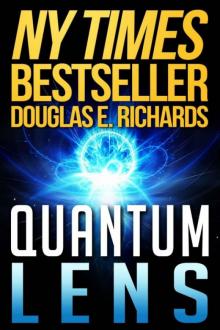 Quantum Lens
Quantum Lens The Cure
The Cure The Immortality Code
The Immortality Code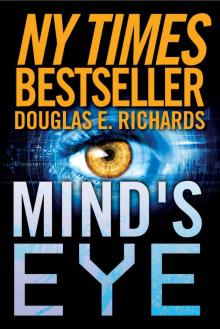 Mind's Eye
Mind's Eye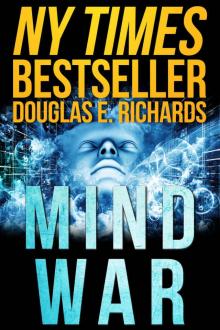 MindWar (Nick Hall Book 3)
MindWar (Nick Hall Book 3)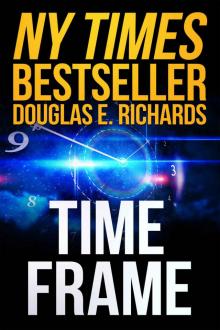 Time Frame (Split Second Book 2)
Time Frame (Split Second Book 2)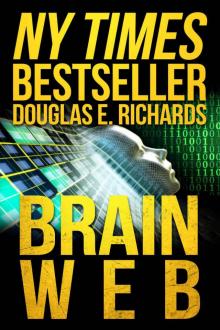 BrainWeb
BrainWeb Wired
Wired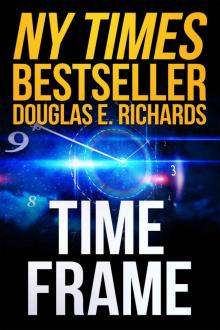 Time Frame
Time Frame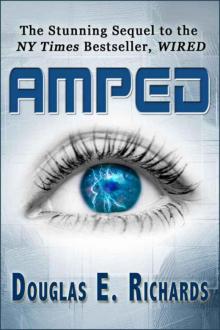 AMPED
AMPED Out of This World
Out of This World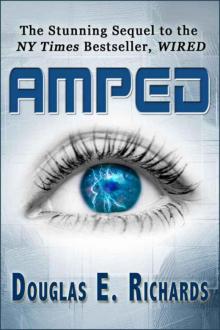 AMPED w-2
AMPED w-2